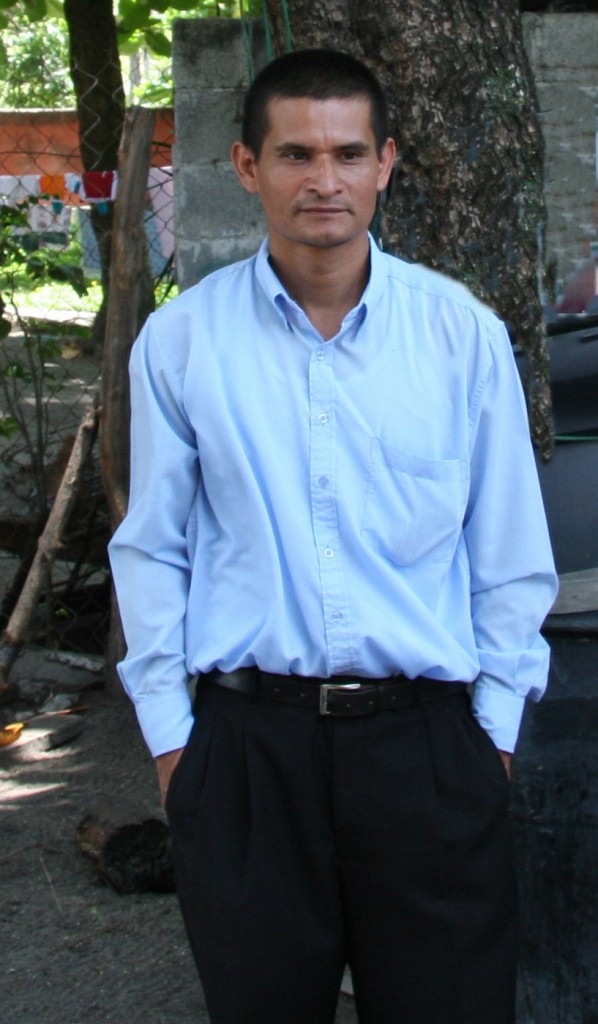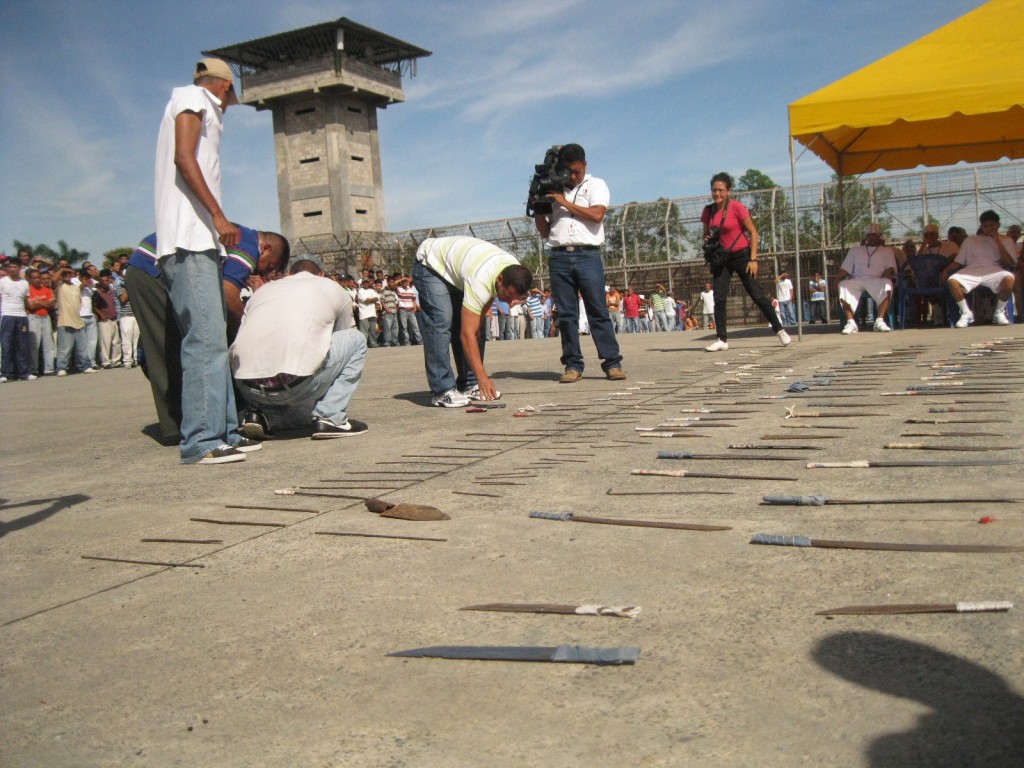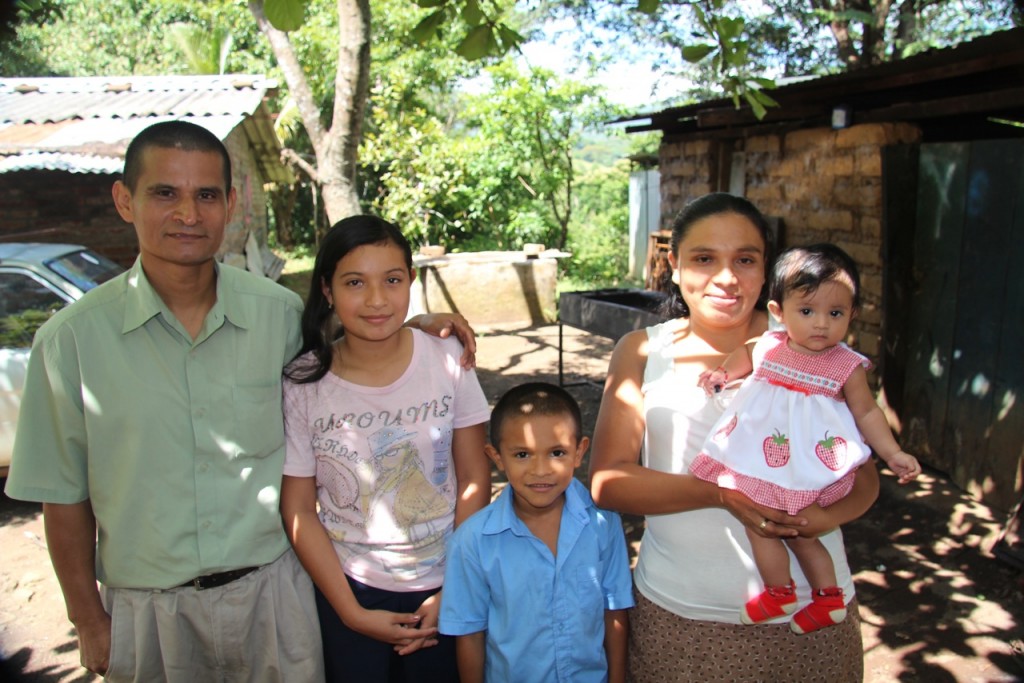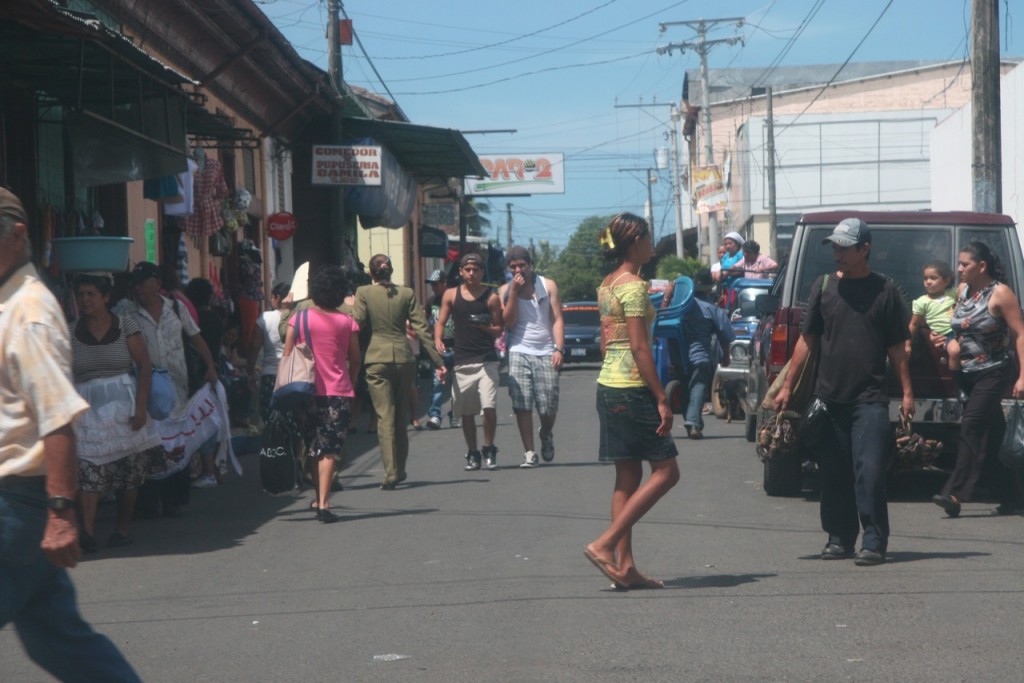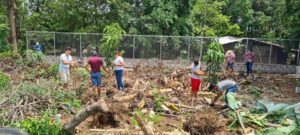The Story of Jose Santiago Munguia
Joe Santiago Mumguia en español
Spanish Translation available here.
“Someone needs to look out for those without a voice; my dream is for them – those without.”
Editor’s Note: This very slightly built, immaculately dressed, accommodating man who goes by the name of Santiago, drives with a Bible on his dashboard serving as a visual compass he steers in his life. He is so soft-spoken that as he translates for us all week, we keep reminding him to speak louder so the tape recorder will pick up his voice. One cannot imagine how this gentle person ever participated and survived, much less escaped from, his former life as a gang member.
Santiago is the quintessential example of a person who has turned his life completely around voluntarily. He was at rock bottom, realized it, and rose out of the pit knowing he could do so only with the help of God. Santiago’s life has all the components of a dramatic movie: an amazing true story, harrowing action thriller, love story, and a good vs. evil plot where good triumphs. If I were a Hollywood producer, I would call it “From Gangs to God”
The reason that I am fluent in English is a rather convoluted story dealing more with a matter of necessity of having to learn it in order to get a job rather than a desire. Like many of us in this country with no job prospects and families to support, my family needed and required me to make the arduous journey to the U.S. which involved their hiring a series of “coyotes” to flee El Salvador through Mexico in 1989 during the war in our country. It cost $1000 at that time (now it costs more than $8,000) to send me, and the trek was very dangerous. The trip took 32 days with some harrowing escapes with immigration officials, running from police, being beaten, etc. At times we had to lie in wait nervously for the right time to meet the next person for another leg of the journey, such as in Guadalajara, Mexico, for nine or ten days and remaining near the border of Tijuana for twelve days. The final leg of the journey was spent crossing the Mexico/U.S. border, then traveling up in deplorable conditions from San Diego to L.A. with 22 persons in the back of an unventilated truck (no windows, no airflow) with no seats. Some of us nearly died. We suffered worse treatment than livestock receives when it is transported You take chances when you are desperate to survive knowing your family is depending on you.
The U.S. was anything but an American dream. It was a different place with a different language, different customs, and a different lifestyle in which I knew only one person. I am the sixth child of eight in my family born on August 23, 1971, in Canton vaso de Gualache in the Usulutan department of El Salvador to my father, Juan, and my mother, Maria Lorenzo Rivera. I have three brothers and four sisters. My mother also had two stillborn births. She delivered most of us alone or was assisted in a few of the births.
“ Yes, sure, you paid the partera {midwife} some money or a chicken depending on what you had. In money the usual price was 25 colones if you had a boy and 15 colones if you had a girl.” From Grandmother to Granddaughter: Salvadoran Women’s Stories, Michael Gorkin, Marta Pineda, and Gloria Leal, p. 147 (University Press, 2006)
My childhood was pretty normal having fun with my siblings and friends learning from one another. We lived in a “rancho” built of wood pieces, a grass roof, and a ground floor, which is not a very comfortable way to live. Ten years later our family moved to another “rancho” on a piece of property owned by a woman who left the country during the war. My mom got her address and received permission to live there, and the woman ended up allowing my mom to get the property registered in our name. That is where we currently live. Getting land security was the one positive thing for our family that resulted from the war.
Everything else changed negatively during that time of war/conflict which began when I was 10. My family needed to move into the city for safety purposes because of all the fighting in our area. I continued to attend school through the 9th grade despite the war. But because of all the disruption in the economy and the large number of people in our family, I was the one sent alone to join my sister in the U.S. to get a job with a 9th grade education and no skills. I was 18 years old.
In order to get a job, I needed to learn to read and write English, so I took a course and studied. I obtained my TPS which gave me legal status to work and get a driver’s license. Those opportunities were the best part of living in the U.S., and I am grateful for them. (Now since 9/11, those same opportunities no longer exist). I stayed in the U.S. for seven years and drove a truck making deliveries for an outdoor furniture company. With the money I earned driving, I was able to support myself as well as send remittances back home to my family to help them. The impact that living in the U.S. had on me was two-fold. First, I had left my family behind, as well as my country, and second, I made some terrible mistakes.
Immigration officials took me into custody on the streets of L.A. once and held me in jail for 31 days while they checked my records but then released me when they discovered I was legal. I harbor no resentment toward the U.S. because it personally gave me a chance during our country’s war. I respect the fact that every country has the right to make its own decisions as to who they allow to come and live there. The American dream works out for some people, but for far too many crossing the border, it is an unwelcome place where that dream does not come true and the economy cannot support them.
My worst experience while living in the U.S. was that I got involved in a gang. I accept full responsibility for my actions and know now that it was wrong but want to tell my story in an effort to keep others from making the same mistake I did. I was living with my sister for six months. She, like others who have had to cross the border to make a living, worked extremely long hours and simply was unavailable to supervise me. Her husband had left her when her boys were young, forcing her into the role of a single parent. Basically after the six months, I was expected to go out on my own and was left without anyone to guide me. I was very confused at that time and didn’t really understand what I was doing and allowed myself to be influenced by friends to do all the terrible things one associates gangs with doing like rape, robberies, and drive bys as gang members in other gangs are targeted. I don’t actually know if I ever killed anyone because I often was the driver, but it is possible. You have to take part in these crimes in order to establish trust in the gang. I feel very bad for having been involved in all of that now.
Living in a gang is like a family, but it is a bad family. It is not a deep or real relationship, only a superficial one. At first it was fun spending all my free time on the streets drinking alcohol, doing drugs, having girls. You think of these people as your friends because you spend so much time together. When they get killed, you feel the same emotions you would for a family member, sad and angry.
In a gang you live confined in these barrios where you have no freedoms and you begin to notice that your “friends” are going to jail, are getting seriously injured, and winding up dead. The younger guys are used as pawns to help recruit and lure their friends into the gang in order to build up its constantly declining membership as its members are killed. Young ones are sometimes enticed into the gang with money to play around with and enjoy or merchandise like nice sneakers. Eventually all the money gets returned to the drug dealer or head of the gang. The gang mentality is stronger than a biological family. I noticed that brothers from the same country who were in different gangs were fighting against each other on the streets. I knew something was wrong with that. In jail gang members often get along better than they do on the outside because they are only segregated by race in jail. Once you get into a gang, it is nearly impossible to get out.
Weapons turned in from a Salvadoran prison.
In 1996 I was arrested due to a problem with the police in California. I got into a bad business where I had rented three rooms in my house to some girls who worked as prostitutes. The police who were investigating them assumed that I was their pimp and took me to jail. I was not their pimp; I only rented them rooms. Although I got out on bail and was supposed to show up in court, instead I got scared and ran across the border because I knew I was unable to pay the legal fees to prove my innocence.
During that time I was involved in a relationship with a girlfriend with whom I had fathered a child. I loved her and our child. My girlfriend and our child accompanied me back to El Salvador. However, after a short time, she didn’t feel safe with me here. She took our child and returned to U.S., and I have never heard from her or about them again. They are U.S. citizens. I still have a lot of unresolved issues about that relationship.
Even after I returned to El Salvador, I continued to be in the gang and began recruiting boys to join the gangs. I had enough money to buy my own truck and work throughout Central America making deliveries of various types of merchandise, such as detergents, sodas, etc. Then one day I had one of many close calls with death while making a delivery.
In 1999 I was making a delivery in my truck from Guatemala to El Salvador. My brother was driving. By this point I had another girlfriend, and she was pregnant. I took her along on the ride to Guatemala because she had never been there. On the way back a small truck got in front of us, forcing my brother to stop while a second small truck stopped beside us. Five people got out with rifles and made us stop and open doors. They got into the cab of the truck, hit our heads, and took control of the truck. They drove us three miles in the bed of truck and made us walk 3/4 mile back into a coffee plantation. Some of them took my truck and two others dug a large trench in the ground and covered us up with dirt around 3 PM leaving us for dead. A big, big rain came; it rained all night, and we felt we were dying under ground. We slowly began to dig ourselves out from about 6 PM til about 11 PM and walked to the road to find people to help get to the police station to file a report. They never found the truck. That event changed my life a lot because that business was my livelihood. I didn’t know any other kind of skill because in the U.S. I also had been a truck driver. I owed rent money on the house in San Salvador, so my girlfriend and I ended up having to move back with my parents while waiting for our baby to be born. I felt bad and helpless.
There have been other brushes with danger in my life, but somehow I have been spared. Once my hand got injured in a knife fight on the street in L.A. and I ended up in the hospital. I was shot in 1997 twice, but they were superficial wounds to my stomach and my leg. When they went to re-load the gun, I was able to run away. These were incidents involving my own gang members who felt I was threatening their power. One began as a fist fight which escalated out of control. I lost a lot of blood and remember nothing for five hours when I was in surgery in the hospital.
Another close call came in 1992 during a traffic accident when I hit an oxcart that I didn’t see coming around the curve of the road. I killed the bull and sent the man to the hospital. That resulted in my spending three days in jail and paying restitution for the two bulls and the man’s medical expenses which I needed to borrow to pay.
My life went into a downward spiral after that, and I became involved in drugs and drinking heavily. I became an alcoholic. It was a very bad time for me; and I was intoxicated for eight straight days and felt my life was finished. I really thought I was dying. My mind was very confused, and I would have hallucinations of devils and demons. At times it felt like the air in my body was not enough, like it was poison. I had no energy or motivation for life. This phase of my life continued until 2002 when I became tired of my life of drinking and drugs and started to think again of God. Although I had been raised in faith and believed in God and had been taught the Commandments, when I was 18 living on my own, I forgot about God and the Commandments. I never thought to take my life because when I was a little boy, maybe seven, my mom always took me to church, and I started to learn about Jesus and understood we are not to take our life. Yet I knew what I was doing was taking my life slowly by putting it in dangerous situations. AA is available and I wish it were promoted and encouraged more by counselors or pastors but it seems the alcoholic has to initiate the need to enroll.
So when things got very bad for me in 2002, I knew God was still there and hadn’t given up on me and was the only one to help me. I asked a friend to take me to a Christian woman who had something different from other people – a special spirit to pray for people. She put her hands on people, and I needed a way to feel different. When she put her hands on me, she told me I had to pray to God every day and change my thinking; and that was the last day I drank the last drop of alcohol. It was in October, 2002, when God took me out of that deep hole and opened my heart.
It was at that point where things began to turn around for me, and I began to realize that living is a process. I am responsible for changing things in my life with God’s help. If I have any bad feeling, I have to change it to feel peace. I know I have to change many things, but I am still willing to change things every day in order to help people, to help my country, to help my family, to help myself. I feel the Holy Spirit in life is a big power we don’t always think about. A gift I have is the ability to talk about my life and show how I am changing. Some people have no hope. I want to show them they can change and have hope. I am living that hope. I am very positive in my life.
The results have been not only within me, but also other people are treating me differently now. I once had an office job to purchase materials. That was a great job, but when the new political party came into power, I lost that job. I know that people believe in me; people trust me. They offer me work opportunities. I learned to do electrical work. I learned construction. From my older brother I learned iron welding which is my current job. People in the community know my skills and employ me when they have jobs. I am very grateful to them.
Santiago’s family
My family is happy because of the way I am living now. Now I have a real family. Life to me means having a family; to have someone to talk to and to care about. I have family members in the U.S. who send money here to subsidize their wives and children. I don’t want to live in another country sending back money. That is not a lifestyle I choose. I love being here surrounded by my family. For the past 12 years I have had a girlfriend, Fatima, whom I married six months ago. She stood by me during those four very rough years, and we have a good life now. We have two children: a boy, Jose, and a girl, Josselin. I openly tell my children about my past life in the gang and admit that I was irresponsible and made bad decisions. I avoid people who drink, so I will not be tempted.
The person I most admire is my dad who has always been a responsible person and a hard worker. He has farmed coffee on someone else’s farm his whole life. When we were young, we kids would help him with the corn and beans as they would need to be harvested. He always encouraged us kids in our educations. Now at age 68, he cultivates corn and coffee on a small parcel of land about 1 manzana, the equivalent of 100 feet by 100 feet. It produces enough for only him and my mother. My mom is 75 or 76 and uses natural remedies for physical pain such as her headaches. It had to be difficult for them to watch how I was living, especially given the fact my dad was a pastor. When he retired, he was given a one-time pension of $4,000. They have always had faith in me and believed I would overcome my difficulties.
I don’t ever want to return to that former gang life again. Some of my former friends in the gangs have been deported; some are in jail and will never get out. Some are permanently disabled as a result of injuries they received in fights. Many of them are happy that I got out and wish they could. I am free on the streets to come and go and do what I choose. I feel better and have no hatred and no enemies. I am much healthier now.
A year ago I returned as a member of the church and have been baptized. I am now a deep friend helping others who need a friend. My wife and children and I worship in a small church of about 80 people. I sing and play guitar there as part of a small band of five members. I actually learned to play by watching as a kid when my brother took lessons. My favorite music is the soft, familiar traditional church tunes, but I also like the oldies tunes from the ‘60s. This is relaxing and enjoyable for me and what I do for fun. I used to play soccer, but don’t have as much time to do that anymore.
Things are improving in my country, but they can improve more. In our local elementary school, for example, there are many new computers, but they are unable to hire a teacher to teach the children how to use them so they just sit there. English is taught from the 7th grade level. That is very important for young people to get jobs in the bars and restaurants. Unfortunately many kids drop out of school before then. I would like to see a system in place that thinks of every human being as its responsibility.
Early morning on Main St. in a small town.
The poor people need much attention in terms of basic needs of food, clothing, and shelter. For 2011 it is very disappointing; you may expect that in some remote areas of Africa, but not here. They need chances and opportunities. Sometimes those who have those things forget about those who do not. They quickly forget to give chances to those without; someone needs to look out for those without a voice; my dream is for them – those without. My dream for my country is to see the end of injustices. I personally know many poor people with three or four children who don’t have enough food for that day. I want to see that change and be a part of changing it. Also having worked within the local government, I witnessed projects get financed but never get implemented because funds got sidetracked for other uses instead. Many people who are educated still don’t have opportunities to use their education in jobs here in our country.
My dream for myself is for good health in order to care for my family. A welder’s eyes will only last about 20 years. I want to have positive energy for my family. I hope to teach others about changing their lives and to be an instrument of God. I believe God has given me answers to change my life so I can help others do the same thing. Now I feel this big power surrounding me. I think my gifts are to help others who seem to have given up on themselves find hope. I now have peace in myself.
Editor’s Note: Santiago shared a couple of vivid experiences while living within the gang that illustrate the stream of moral consciousness he was developing. Each are evidence of his gaining courage in his Christian convictions prior to making the decision to leave the gang.
“The guy with the gun that day was my friend. He was determined to shoot this young kid. I saw no reason for the kid to die. I had to stop this death from happening. I stood between the gun and the young kid. Yes, my friend could have turned the gun on me for interfering with his plan making me the victim instead. I trusted my friend NOT to shoot me. That moment of hesitation was enough delay to allow the kid time to get away.
Another time the gun was pointed directly at my temple. I knew in that instant my life could end. Something inside me took over and instead of cowering to my imminent death, I found myself responding to my would-be assailant, ‘If Jesus wants you to shoot me, go ahead.’ Miraculously this guy’s hands began to tremble, then shake violently out of control to the point that he dropped the gun to the ground.”
Responding to these incidents as Santiago did take tremendous courage. Leaving the gang and alcohol took walking with God.
